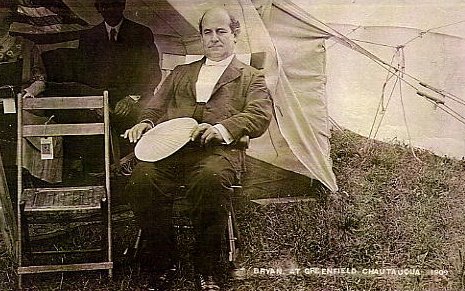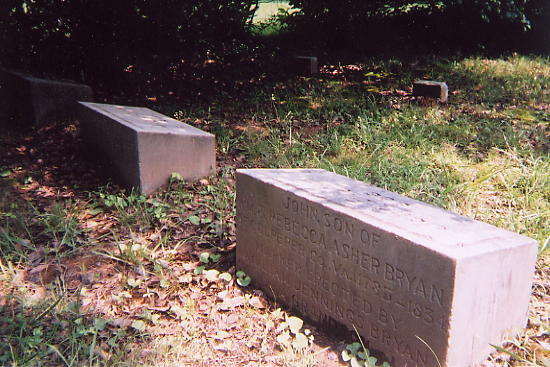|
Ideals and American Destiny: Bryan’s Vision by After his third presidential campaign ended in defeat by William H. Taft (1908), Bryan could have quit the political arena. He had failed to stir the nation as he had in 1896, and perhaps had become too familiar a presence. Yet, even in defeat, Bryan remained the titular leader of his party and a crusading orator. His talks inspired a vast following, and one of his favorite platforms was the Chautauqua lecture series (see photo below). Always the optimist/idealist, Bryan never let setbacks or detractors dog him. Infused in his inner being was a set of ideas to which he remained committed, and about which he could speak passionately and articulately. |
||||||
One of his writings, The Value of An Ideal (1901), captures many of these themes and truths and deserved re-reading, especially today. It was written in the wake of Bryan’s second loss to McKinley (Election of 1900) and provided an outline for many of his speeches. Consider some of the passages: "The ideal dominates life and lifts the holder above the world’s sordid selfishness that surrounds them and makes them find delight in bringing life and light of hope into homes that are dark . . ." " . . . whether he has paid back the debt he owes to the patriots, who with blood and sacrifice purchased the liberties which we are enjoying . . ." "We have received so much from the generations past and from those about us that instead of boasting of what we have done, we ought to learn humility and be content if, at the end of life, we can look back over the years and be assured that we have given the world a service equal in value to that which we have received . . ." "A conscience is stronger than money . . .We must appeal to an American conscience (not a Democratic or Republican conscience), and place this awakened conscience against the overflowing tide of corruption in the United States . . ." "The country is suffering today from a demoralization of its ideals." Months after this photograph was taken, Bryan hurled himself onto the international speaking circuit with trips to Central and South America, and Edinburgh, Scotland where he spoke eloquently for world peace (1910), and advanced his ideas for dispute arbitration among nations. Two years later Bryan reached a new elevation when he was named Secretary of State in the first Wilson Administration. Bryan’s Faith-Based Initiatives
Following World War I, with disillusionment rampant, Bryan’s own sense of ideals and self-interest was tested. He moved to South Florida and became a millionaire in real estate. A cousin, William S. Jennings, who earlier had initiated early dredging and landfill projects in the Everglades as Florida’s governor, opened doors for Bryan. In an era of declining morals and get-rich schemes, Bryan taught bible classes and gave outdoor sermons in Coral Gables. Late in life, he became convinced that the Nation’s youth were losing touch with the values which had built the country. The Great Commoner became more fervent, weaving religion into his talks as a way to reach his diverse audiences. One of Bryan’s favorite hymns contained the phrase he loved to quote at the end of his talks:
In the aftermath of Election 2000, with the Nation transfixed by what happened in Florida and still searching for truth, looking back at Bryan’s life and last message might provide some insights. Contributions to the William Jennings Bryan Recognition Project (WJBRP) The Agribusiness Council -
WJBRP Questions may be directed to the project secretariat at: "Statesman, yet friend to truth, of soul sincere, |

